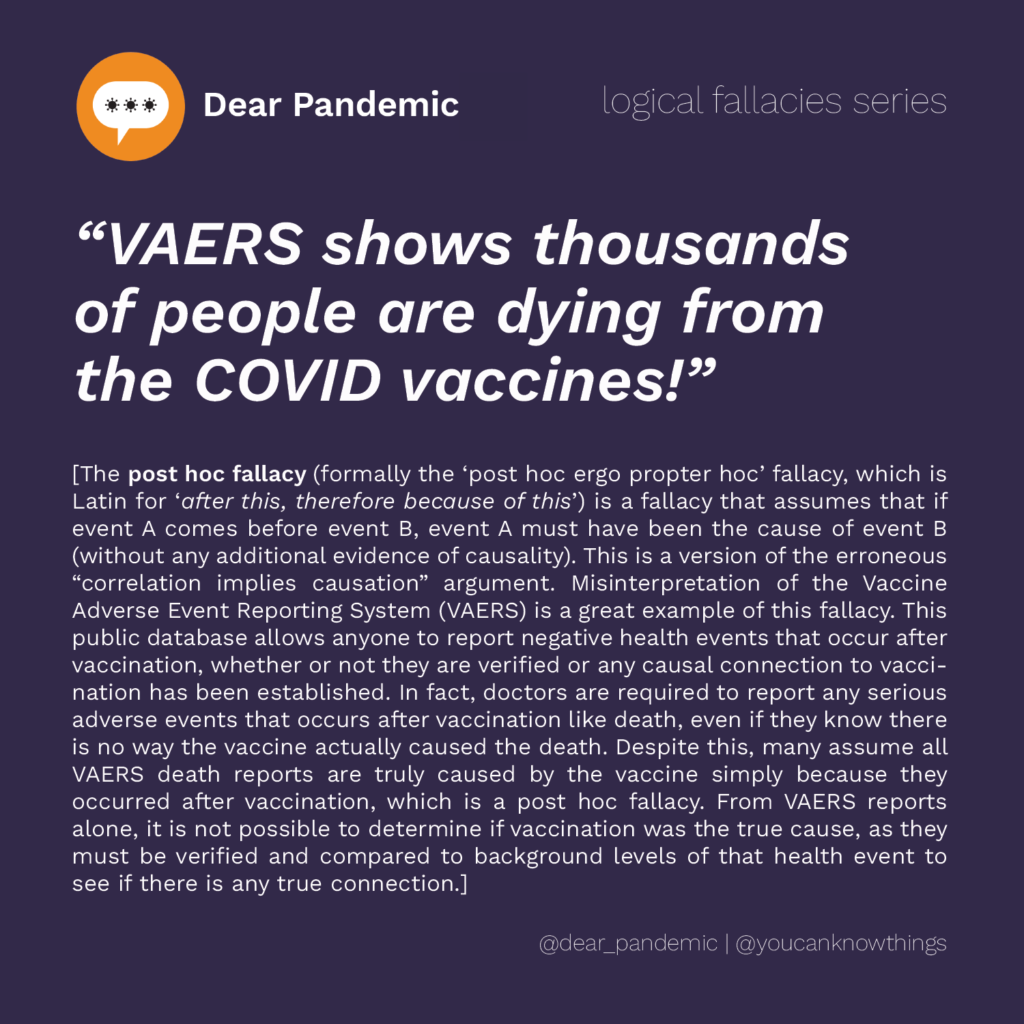At Dear Pandemic, we want to dish out science facts AND equip our readers with tools to make sense of data and science themselves.
This is the 5th post in an ongoing series by Dr. Kristen Panthagani of You Can Know Things, in which she dissects common logical fallacies that have led people astray during the pandemic.
⚠️ The Post Hoc Fallacy ⚠️
“VAERS shows thousands of people have died from the COVID vaccines!”
The post hoc fallacy (formally the ‘post hoc ergo propter hoc’ fallacy, which is Latin for ‘after this, therefore because of this’) is a fallacy that assumes that if event A comes before event B, event A must have been the cause of event B (without any additional evidence of causality). This is a version of the “correlation implies causation” argument. Misinterpretations of the VAERS database are a great example of this. Many people assume that if a negative health event occurred shortly after vaccination, that proves the vaccine caused it. This is false and is an example of the post hoc fallacy, because temporal association alone is not enough evidence to determine if one event is the cause of another. It is unreasonable to assume that with millions of people getting vaccinated, nobody will have any unconnected negative health events within the weeks following vaccination. Statistically, we know there will be some negative health events that occur after vaccination purely due to chance. See this DP previous explainer.
From VAERS reports alone, it is not possible to determine if vaccination was the true cause of the reported adverse event. To tell the difference between unrelated adverse events and true vaccine side effects, VAERS reports are verified and studied to determine if there are adverse events that are occurring more often after vaccination than would be expected from background levels (more detail).
This is how VAERS is used properly and why it’s such a useful vaccine safety monitoring tool. In fact, there is one vaccine I *didn’t* get because of VAERS reports that were used correctly. That story is told here.
A note on logical fallacies:
Logical fallacies are common patterns of reasoning that seem true on the surface but have one or more critical flaws. At their root, many are oversimplifications–like a cognitive shortcut. They are appealing because they make something complex, like vaccine safety or the efficacy of masks, into something simple and easy to understand. However, this oversimplification often leaves out important details, leading to the wrong conclusions.
Logical fallacies are common and used by people arguing both for and against nearly every pandemic topic. They are NOT a sign of stupidity or lack of intelligence: they have tripped up nearly everyone at some point. And just because someone uses a fallacy in their argument doesn’t automatically mean they’re wrong — (that’s the fallacy fallacy!). It simply means they haven’t provided adequate evidence supporting their argument, but that evidence may in fact exist. It’s useful to recognize logical fallacies in our own thinking so we can make more accurate conclusions about the world around us.

More reading:
CDC Selected Adverse Events Reported after COVID-19 Vaccination
You Can Know Things – Are COVID vaccines killing thousands of people?
More in this series:
The Appeal to Authority Fallacy


